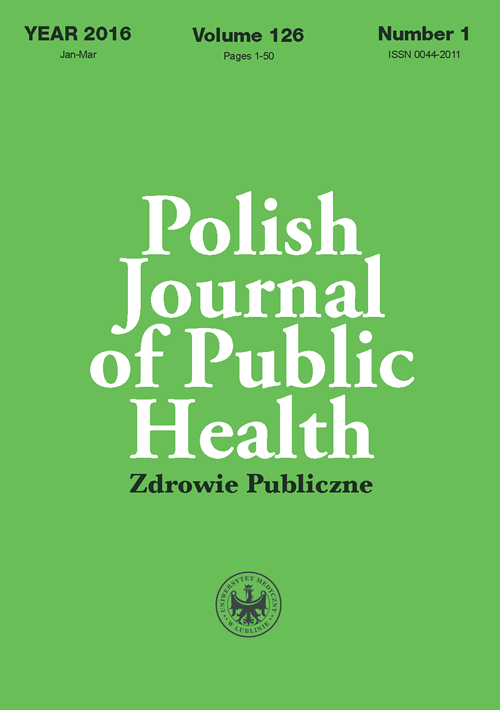Opinion of students of Medical University of Lublin on emergency contraception
DOI:
https://doi.org/10.1515/pjph-2016-0009Keywords:
emergency contraception, religion, medical studentsAbstract
Introduction. Many women at the reproductive age face the dilemma of choosing the best contraceptive method. Apart from the natural birth control methods, there is a large selection of barrier, hormonal or invasive procedures. Birth control also includes emergency contraception, which can be used in a short period of time after an unprotected sex. In 2015, Ella One (uliprystal acetate) has been approved as an over-the-counter drug in Poland.
Aim. The purpose of this study was to check the knowledge and survey opinions of students of various faculties of Medical University of Lublin concerning the topic of emergency contraception.
Material and methods. An anonymous online questionnaire was used in the study. It included single and multiple-choice questions. The results were analyzed using Microsoft Excel 2011.
Results. 256 students, aged 19-27 took part in the study. 81.3% of the respondents declared themselves as Christians. 47% of interviewees said that using emergency contraception is ethical. In the group of Christians, 37.5% claimed that emergency contraceptives should not definitely be sold as an OTC drug while among the non-religious individuals, only 6% shared that view. 60.6% of students decided that EC is not a form of abortion, On the other hand, 29.9% opted for it being an abortion. In the group of female participants, 14.9% said that they had used emergency contraception at least once in their lives. As it comes to evaluation of students’ knowledge about the topic, only 15.23% knew the way of uliprystal acetate worked and even less (11.32%) were able to explain the way levonorgestrel works.
Discussion. According to the Catholic Church, the only acceptable forms of family planning include sexual abstinence during fertile days or calendar-based contraceptive methods. Postcoital contraception is treated as a sin punished with excommunication. Therefore, adhering by the rules imposed by the Roman Catholic Church has huge impact on the choices that believers make, also when it comes to birth control. This statement has been confirmed by many studies conducted in Poland, where 90% of population consider themselves Catholics.
Conclusions. Emergency contraception remains a controversial topic in Poland. Students of Medical University of Lublin seem to have insufficient knowledge about the effects of available drugs. There is a need to educate future healthcare providers, so they could provide reliable advice and recommendations to their patients.
References
1. Konferencja Episkopatu Polski. Stanowisko Zespołu Ekspertów ds. Bioetycznych Konferencji Episkopatu Polski w sprawie dopuszczenia do swobodnego obrotu handlowego pigułki postkoitalnej. [http://episkopat.pl/dokumenty/pozostale/6396.1,Stanowisko_Zespolu_Ekspertow_ds_Bioetycznych_Konferencji_Episkopatu_Polski_w_sprawie_dopuszczenia_do_swobodnego_obrotu_handlowego_pigulki_postkoitalnej.html]
2. Trussell J, Schwarz EB. Emergency Contraception. 20th revised ed. New York: Ardent Media; 2011.
3. Belluck P. New birth control label counters lawsuit claim: European authorities found that a drug line Plan B One-Step cannot prevent fertilized eggs from implanting in the womb. The New York Times. 2013;27:A17.
4. Cleland K, Zhu H, Goldstruck N, et al. The efficacy of intrauterine devices for emergency contraception: a systematic review of 35 years of experience. Hum Reproduc. 2012;27(7):1994-2000.
5. European Medicines Agency. Summary of Product Characteristics: ellaOne 30 mg tablet [http://www.ema.europa.eu/docs/en_GB/document_library/EPAR_-_Product_Information/human/001027/WC500023670.pdf]
6. Hatcher RA, Trussell J, Nelson AL. Contraceptive technology. Ardent Media; 2007. p. 284-5.
7. Rutkowska A, Rolińska A, Milanowska J, et al. Metody zapobiegania ciąży w ocenie kobiet w wieku rozrodczym a deklarowana istotność wiary katolickiej - badania pilotażowe. Med Og Nauk Zdr. 2012;18(2):113-7.
8. Paweł VI, enc. Humane vitae, 12.
9. Bajda J. Powołanie małżeństwa i rodziny. Fundacja „Pomoc Rodzinie”. Łomianki; 2010.
10. Kongregacja Nauki i Wiary: Instrukcja Dignitas personae dotycząca niektórych problemów bioetycznych. Kongregacja Nauki Wiary; 2008.
11. Kodeks Prawa Kanonicznego, Kan. 1398 §2.
12. Wilczak M, Więznowska-Mączyńska K, Kątniak M, Opala T. Antykoncepcja hormonalna wśród studentek Akademii Medycznej w Poznaniu. Prz Ginekol Położ. 2006;6(3):143-8.
13. U.S. Conference of Catholic Bishops (USCCB). Ethical and religious directives for Catholic health care services. 5th ed. Washington, DC: USCCB; 2009.
Downloads
Published
Issue
Section
License
Copyright (c) 2016 Polish Journal of Public Health

This work is licensed under a Creative Commons Attribution-NonCommercial-NoDerivatives 3.0 Unported License.


